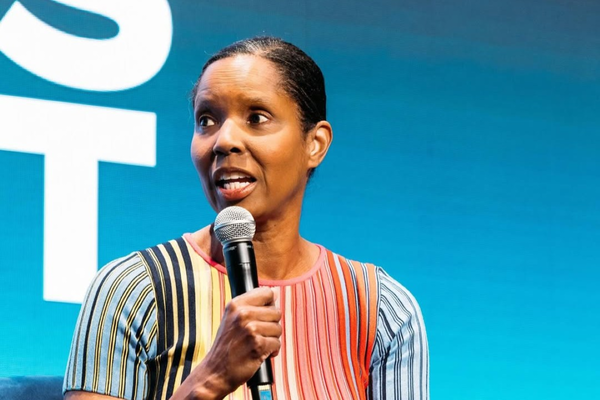

“I knew I wanted to be an Olympian, but I did not know if I wanted to be a goalkeeper. Or that soccer would even be the way I’d do it,” said USWNT icons Christen Press and Tobin Heath‘s podcast guest. It was a statement that surprised the soccer stars because their podcast guest was none other than Briana Scurry. A World Cup and Olympic gold winner, Scurry is more than one of the greatest keepers in US women’s soccer history; she is a pioneer.
So naturally, Press and Heath were under the impression that Scurry had known her ‘destiny’ since a kid. Turns out, Scurry simply wanted to be an Olympian and didn’t even play soccer before he was 12. “That is not young,” said Press as Scurry kept the surprises coming. Your regular pro athletes start long before they reach a double-digit age, but the soccer icon started late. What more? The coach of the boys’ team she was playing soccer for thought it would be “safe” for Scurry to mind the net.
Yes! You read that right. The USWNT legend started at 12 and played with the boys to start her soccer journey. Yet, while she fell in love with goalkeeping, Scurry later realized her first coach’s misconception about safety concerns. “As we all know… It’s the opposite is true, it’s the most dangerous place to be,” Scurry said on the Re-Cap Show podcast. It’s something the veteran soccer legend found out the hard way.
ADVERTISEMENT
Article continues below this ad
That’s because after fulfilling her Olympic dream, winning two medals in 1996 and 2004, and the World Cup in 1999, one hit was all it took to end her illustrious career. During a regular game of the 2010 season of the Women’s Professional Soccer league, a striker from the opposing team collided knee-first into Scurry’s temple. The injury was devastating.

“My whole life changed from that moment. I knew there was something really wrong… That was the last soccer game I’ve ever played,” the USWNT icon told NPR. The massive collision gave Briana Scurry a traumatic brain injury. The side effects ended her soccer playing days as constant headaches, blurred vision, and cognitive issues degraded her mental health and quality of life. Yet, the 53-year-old’s struggles had just begun.
What’s your perspective on:
Is Briana Scurry's career-ending injury a wake-up call for better athlete protection in sports?
Have an interesting take?
The USWNT journey through adversity
Briana Scurry, the first black woman to make it into the National Soccer Hall of Fame, suddenly found herself without a job. She could never play soccer again with the brain injury, and the Women’s Professional Soccer League collapsed soon after her injury. The result? The Olympic gold medalist didn’t have the medical support she needed. Yet somehow things got even worse.
The USWNT goalkeeper turned to her insurance company to cover the cost of her surgery, but they refused. Unable to find a solution, Scurry had to sell the gold medals she had dreamed of winning since she was only 8 years old. “It was the most difficult thing I’d ever done in my life,” the soccer legend told NRP. Yet, the 53-year-old didn’t back down.
ADVERTISEMENT
Article continues below this ad

ADVERTISEMENT
Article continues below this ad
Growing up in a “small, rural” area, playing with the boys, and making her name during a time when the USWNT barely had any black women, Briana Scurry was no stranger to the face of adversity. 32-year-old Dunne had revealed the challenges her predecessor faced in 2021. “When I first joined the team, there weren’t many people that looked like me,” said Crystal Dunne.
“So I kind of had to get my footing in an environment that was like I don’t really have someone to lean on in times where I may feel isolated or alone in certain instances,” she added. Scurry sold her medals for $18,000 a piece. “It was the patch and the temporary fix,” she told NPR. Thankfully, things did get better when Chryssa Zizos, who later married Scurry, helped her secure the insurance coverage and even buy back those coveted gold medals.
ADVERTISEMENT
ADVERTISEMENT
ADVERTISEMENT
ADVERTISEMENT


Is Briana Scurry's career-ending injury a wake-up call for better athlete protection in sports?